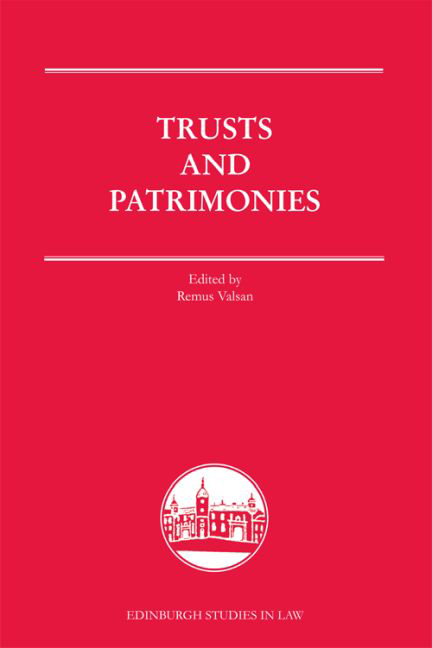Book contents
- Frontmatter
- Contents
- Preface and Acknowledgements
- List of Contributors
- List of Abbreviations
- Table of Cases
- INTRODUCTION
- PART I PATRIMONY AND THE COMMON LAW TRUST
- PART II PATRIMONY AND THE SCOTTISH TRUST
- 5 Trusts without Equity
- 6 Patrimony not Equity: The Trust in Scotland
- 7 Scottish Trusts in the Common Law
- PART III TRUST AND PATRIMONY IN FRANCE, QUEBEC AND THE NETHERLANDS
- Index
5 - Trusts without Equity
from PART II - PATRIMONY AND THE SCOTTISH TRUST
Published online by Cambridge University Press: 15 September 2017
- Frontmatter
- Contents
- Preface and Acknowledgements
- List of Contributors
- List of Abbreviations
- Table of Cases
- INTRODUCTION
- PART I PATRIMONY AND THE COMMON LAW TRUST
- PART II PATRIMONY AND THE SCOTTISH TRUST
- 5 Trusts without Equity
- 6 Patrimony not Equity: The Trust in Scotland
- 7 Scottish Trusts in the Common Law
- PART III TRUST AND PATRIMONY IN FRANCE, QUEBEC AND THE NETHERLANDS
- Index
Summary
Perhaps the greatest difficulty the civilians have in accepting the trust is caused by what I have come to regard as an English peculiarity logically detachable from the trust, namely, the distinction between the legal and the equitable estate. In Scots law, which, even if it did not invent and develop the trust for itself but took it over from England – the point is doubtful – has accepted it without inhibitions or reservations, no such distinction has ever been known. There the trustee becomes owner and the beneficiary acquires a contractual right against him.
INTRODUCTION
For the comparatist the trust is problematic. For this there are two main reasons. The first is that the slogan of modern comparative law – “compare function rather than form” – does not work for the trust. One cannot identify the function of the trust because there is no such function. The trust is functionally protean. Trusts are quasi-entails, quasi-usufructs, quasi-wills, quasi-corporations, quasi-securities over assets, schemes for collective investment, vehicles for the administration of bankruptcy, vehicles for bond issues, and so on and so forth. In software terminology, trusts are emulators. They are not even confined to private law. They can exist in public law, and can also straddle the private/public boundary.
The second reason why trusts have proved so problematic for the comparatist is that there is a widespread belief that they are a special product of the common law tradition and, in particular, of its law/equity duality, and thus intrinsically mysterious to the civilian tradition. Trusts are supposed to be an Athanasian mystery. The Hague Convention on the Recognition of Trusts tells us that “the trust, as developed in courts of equity in common law jurisdictions and adopted with some modifications in other jurisdictions, is a unique legal institution …”. The trust is unique because it is founded on the division between law and equity and the consequent division of property rights into legal and equitable. The Privy Council has said that “the distinction between the legal and the equitable estate is of the essence of the trust”.
- Type
- Chapter
- Information
- Trusts and Patrimonies , pp. 87 - 109Publisher: Edinburgh University PressPrint publication year: 2015



